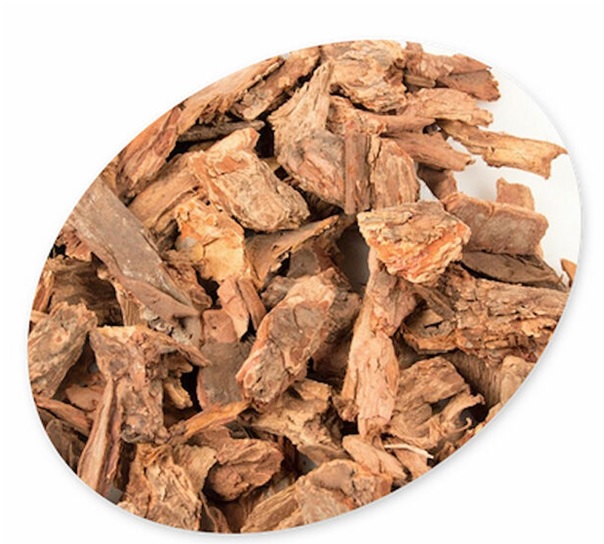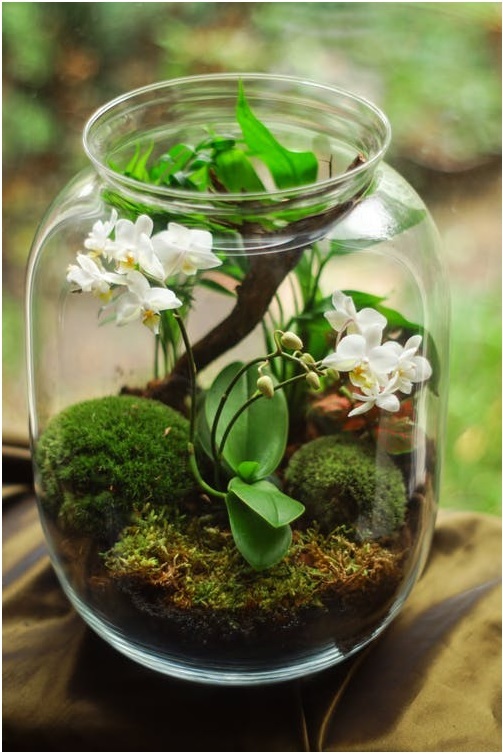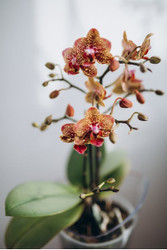Why Orchid Bark Is an Excellent Growing Medium
May 23rd 2022
If you’ve never grown orchids before, you might think that they, like many other plants, will do just fine in a pot, outdoors, in full sun.
This could not be farther from the truth. Even though the “uninitiated” might think that “plants are plants” every species is as diverse in its biological needs as animals are.
Case in point: you can’t keep a dog in a fish tank.
The same is true for orchids. They have very unique needs among plants and trying to grow an orchid as if it is a tomato plant or a rosebush will at best result in an unhappy plant and at worst in a dead one.
So, let’s talk about orchid bark, which is a commonly used orchid growing medium preferred by many horticulturists.
What You Need to Know
In the wild, most orchids are epiphytes, which are also known as air plants. Whereas most other species of plants have subterranean root systems, epiphytes, like orchids, actually grow on other plants, sort of as parasites.
This means, among other things, that orchids have very shallow root systems. In fact, some orchid species sprout “aerial roots” that grow above the substrate. These should not be trimmed, as they assist with absorbing moisture from the atmosphere as well as with gas exchange.
Orchid fir bark replicates this natural scenario, in which the plants would be growin parastically on other trees in the world. It is, after all, literally a bark mix made from actual trees. Typically, orchid bark is made with fir and pine bark, but it can be made from others as well. In fact, even orchid potting mixes that are not pure bark are made with chips of bark, anyway.
There are several functional reasons that bark is used as a medium for orchids. One is that it is not very dense, so it allows airflow to the roots. Orchids, like almost all other plants, need some degree of aeration around their roots - and orchids more than most. Most plants can drown if left in standing water or waterlogged soil - orchids definitely will.
This is another thing orchid bark provides - excellent drainage. Because it is highly, porous and very loose, it helps prevent overwatering. The keyword here is helps. It doesn’t prevent overwatering, but since it drains so well it’s a good medium for most orchids.
In addition, even though orchid bark is typically pretty loose, it’s not as loose as most other potting mixes. This helps provide some structural support to orchid plants, which can have fragile root systems and flower spikes.
One more thing to note about orchid bark: since it has so many voids, there is plenty of room to add other media such as orchid moss to aid with moisture retention - see below.
How to Shop for Quality Orchid Bark

If you’re going to repot your orchids or other tropical plants in a bark medium (and there are many reasons why you should) then there are a few things you should look for before you purchase.
If you’re going to purchase loose fir or pine bark, look for a medium that has been screened to ensure consistency in the sizes of the chips or chunks. Then you can pair the medium density to the needs of your plants.
You should also be aware of alternatives to pine or fir bark like New Zealand tree fern bark, which is also an excellent orchid growing substrate.
Tree fern is softer and spongier than fir or pine park, which helps it to retain moisture better while still providing adequate drainage and aeration. Tree fern is also slow to compost, which can help prevent fungal infections in your orchid growing substrate, since it should be wet all the time.
What Else Should You Get with Orchid Bark?
If you’re thinking about expanding your green thumb qualifications to growing orchids, there are a few other essential orchid supplies you should get in addition to orchid bark. Here are some of the most important of them.
●Orchid Pots/Orchid Baskets:
Orchids don’t tolerate repotting well to begin with, and they should not and cannot be planted in solid glass or ceramic pots that offer little to no airflow and minimal drainage.
In fact, orchids do best in small, perforated pots - such as plastic, although glass and ceramic are acceptable as well. Some people even prefer to grow them in baskets, as these not only drain well but allow plenty of airflow to reach the orchids’ roots.
●Orchid Moss:
We’ve made it pretty clear by now that orchids are intolerant of overwatering and require adequate drainage and airflow to their roots.
While that is absolutely true, orchids also are found in tropical and subtropical regions that are not only warm but humid, year-round.
So, as intolerant as orchids are of overwatering, they are also intolerant of dry potting medium. If you allow your orchid bark to completely dry out, you can cause die-back, blossom drop, or even kill the plant.
So, many orchid growers throw a little bit of orchid moss (which is typically sphagnum moss) in their potting medium.
Orchid moss can absorb a great deal of water without becoming waterlogged, releasing it slowly over time. This helps to regulate the moisture content of the medium in which the orchids are growing and helps prevent the mix from drying out entirely, keeping orchids happy and healthy.
●Orchid Food:
On the grand scale of things, orchids are not heavy feeders. However, in between blooming periods when the plants are actively growing, it’s essential to furnish the plant with the nutrients it lost while producing flowers.
Many orchid-specific blends are available and are nitrogen and potassium (potash) heavy. Blends specific to orchids are typically somewhere in the area of 11-11-18 or 20-10-20. The high nitrogen content encourages foliation and the high potassium content ensures overall wellness.
Get some fertilizer and after the flowers drop from the spike, start feeding your plants once every two weeks or so to encourage healthy growth which will improve the odds that the plant will once again enter a blooming phase!

Questions? Call Us!
You can get not only orchid bark here but also orchid pots, orchid moss, and orchid fertilizer - as well as live plants if you wish! Keep in mind, shipping is free on every order, every time!
Still, if you have any questions, feel free to reach out to us. We aim to ensure that our customers are satisfied and that their orchids thrive - so contact us at 770-683-5579 if you have any questions.

